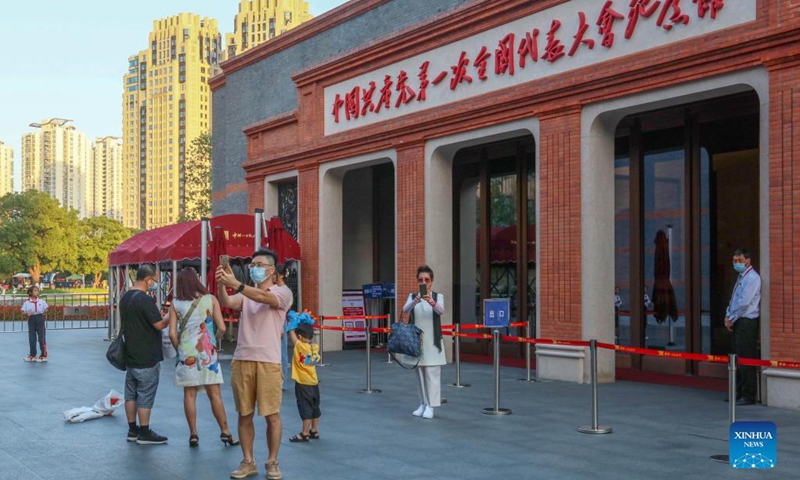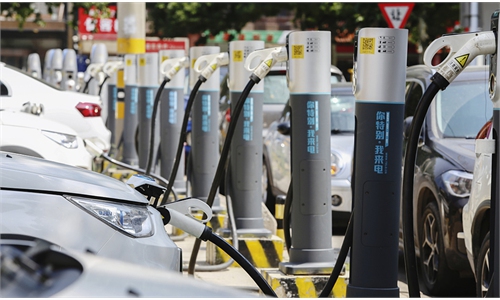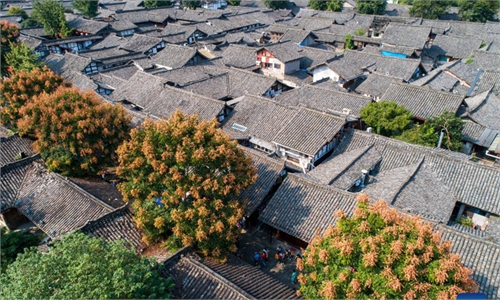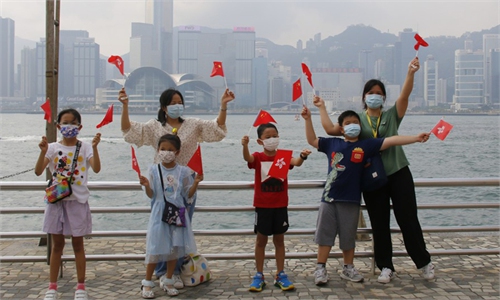
Tourists take photos at the memorial of the first National Congress of the Communist Party of China (CPC) in east China's Shanghai, Oct. 3, 2021. East China's Shanghai is home to many landmark sites which bear witness to the CPC history and the CPC revolutionary activities. As "red tourism" becomes increasingly popular, the city has launched a special hop-on hop-off bus service that provides more fun to travel between five notable "red sites" during the National Day holiday. (Xinhua/Wang Xiang)
China's week-long National Day holidays beginning October 1, known as the country's "Golden Week", saw flourishing spending in sectors like movies and duty-free stores, although travel was restrained by the lingering impact of the coronavirus, a phenomenon that experts said reflected China's booming spending power that is making consumption the nation's new economic locomotive.
During the holidays, passenger travel, especially long-distance trips, dropped as a result of recent sporadic outbreaks of coronavirus cases.
According to data released by the Ministry of Culture and Tourism on Thursday, Chinese people made 515 million trips during this year's National Day holidays, down 1.5 percent year-on-year on a comparable basis and reaching 70.1 percent of pre-coronavirus levels.
However, the fact that people refrained from traveling far didn't stop them from spending generously, as they turned to other forms of consumption like movies and short-distance trips to release their desire to spend money.
Dong Dengxin, director of the Finance and Securities Institute of Wuhan University, who made a trip to villages near Wuhan during the holiday, said that he found travel spots had huge visitor flows during the holidays. In particular, some children's parks were very popular, although they charge excessive fees.
"In my observation, Chinese consumers have the money and the confidence to consume, and consumption has largely returned to 2019 levels," he told the Global Times.
By 5 pm on Thursday, China's box office during the National Day holidays hit 4.25 billion yuan ($659 million), surpassing last year's 3.95 billion yuan.
According to statistics released by China UnionPay on Thursday, the UnionPay system handled 2.31 trillion yuan worth of online transactions from last Friday to Wednesday, with average daily transactions surging by 32 percent compared with last year's National Day holidays.
A report compiled by Alipay on Wednesday also showed that Hainan Island's duty-free consumption was up 87 percent.
Expert said that the booming consumption statistics attest to the fact that China's consumption drive, levels and desires have not changed, despite sporadic flare-ups of the coronavirus.
"China's consumption boom is a result of demand rebounding after spending was largely suppressed last year. It is also a result of China's stable economy, robust employment and moderate inflation levels," Hu Qimu, chief research fellow at the Sinosteel Economic Research Institute, told the Global Times on Thursday.
Dong said that consumption will likely be the major driver of China's economy this year, as other pillars of the economy such as trade and investment will face much more pressure, caused by pandemic uncertainties.
"Investment will be restrained by China's property tightening policies, while decreasing overseas demand, burdened by the global pandemic, will hurt China's exports," Dong said.
The stable economic situation and robust domestic consumption also injected Chinese economists more confidence to forecast healthy GDP growth this year. Hu, for example, anticipated that China's economy will grow by about 8 percent this year.
"The biggest pressure will be on the manufacturing sector, as rising material prices and electricity shortages will cut into companies' profits," he said.
Dong said that it's hard to predict this year's GDP, as he said that the coronavirus situation still features a lot of uncertainties globally, especially in the coming winter time.
"The peak (for this year China's economic growth) is known, but the bottom is hard to guess," he said.




